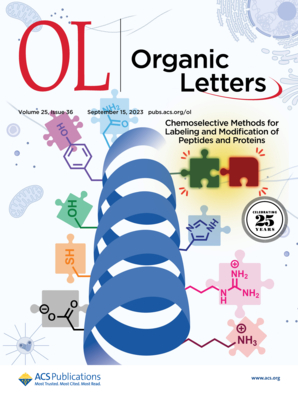Cascade C–H Halogenation of Tetraazapyrene with Iodine Halides
IF 5
1区 化学
Q1 CHEMISTRY, ORGANIC
引用次数: 0
Abstract
Iodine halide as an efficient and selective halogenation reagent is presented for the cascade halogenation of an electron-deficient tetraazapyrene (TAP), yielding both chlorinated and heterohalogenated derivatives. This approach enables precise control over the LUMO energy levels of the resulting TAPs by varying the type and extent of halogenation, offering a powerful strategy for fine-tuning their electronic properties. These findings open new avenues for the rational design of TAP-based materials in organic molecular electronics.
四氮芘与碘卤化物的C-H级联卤化反应。
卤化碘作为一种高效、选择性的卤化试剂,用于缺电子四氮芘(TAP)的级联卤化反应,生成氯化和杂卤化衍生物。这种方法可以通过改变卤化的类型和程度来精确控制所产生的tap的LUMO能级,为微调其电子特性提供了强大的策略。这些发现为有机分子电子学中tap基材料的合理设计开辟了新的途径。
本文章由计算机程序翻译,如有差异,请以英文原文为准。
求助全文
约1分钟内获得全文
求助全文
来源期刊

Organic Letters
化学-有机化学
CiteScore
9.30
自引率
11.50%
发文量
1607
审稿时长
1.5 months
期刊介绍:
Organic Letters invites original reports of fundamental research in all branches of the theory and practice of organic, physical organic, organometallic,medicinal, and bioorganic chemistry. Organic Letters provides rapid disclosure of the key elements of significant studies that are of interest to a large portion of the organic community. In selecting manuscripts for publication, the Editors place emphasis on the originality, quality and wide interest of the work. Authors should provide enough background information to place the new disclosure in context and to justify the rapid publication format. Back-to-back Letters will be considered. Full details should be reserved for an Article, which should appear in due course.
 求助内容:
求助内容: 应助结果提醒方式:
应助结果提醒方式:


